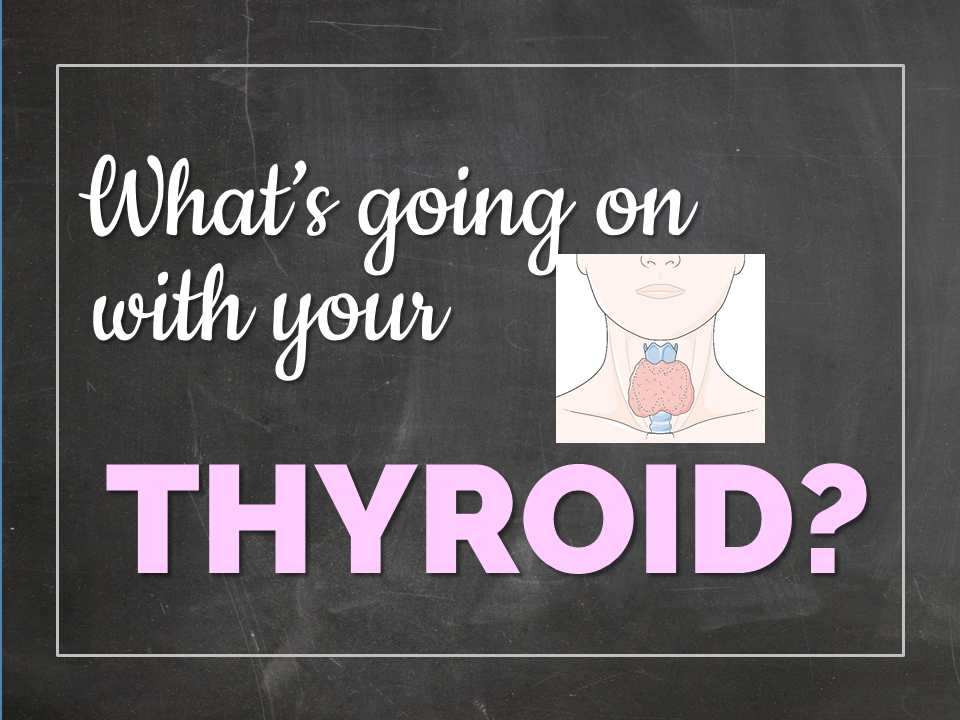Finally, I’m addressing this topic today!
I realize I haven’t yet written a post specifically about the THYROID GLAND.
Yet it plays a huge role in our health and well-being.
Especially for us ladies in mid-life and later.
And lately, I’ve noticed something really concerning.
At least half of my clients have a THYROID condition.
And for most of them it’s a form of hypothyroidism, called Hashimoto’s thyroiditis.
Hypothyroidism is basically a slowing down of the functioning of the throid.
So, I’ve been looking more deeply into hypothyroidism, and Hashimoto’s in particular.
First, because I want to help my clients who are living with this dis-ease.
And second, I also want to get the word out, and raise awareness.
Because Hashimoto’s is so incredibly common.
And part of me wonders if it constitutes and epidemic.
But let’s start at the beginning…
What’s the thyroid and what does it do?
The thyroid is a butterfly shaped gland near the base of your neck.
It’s small but it controls so many of your metabolic processes.
Metabolic processes are processes where your body uses or converts energy.
Processes like calorie burning, digestion, maintaing body temperature, maintaining heart rate, brain function, and many more.
So, when you have hypothyroidism, all these processes slow down.
As a result, some of the symptoms of hypothyroidism are:
- Weight gain
- Fatigue, sluggishness
- Decreased heart rate
- Constipation
- Hair loss
- Brain fog
- Depression
- Stiff joints
- Muscle achiness
- Sensitivity to cold
- Goiter (enlargement of the thyroid gland)
What is Hashimoto’s hypothyroiditis?
So, first thing to know is that Hashimoto’s is an auto-immune disorder.
In fact, it’s the most common auto-immune disease in the world:
- Women are 5 to 8 times more likely to suffer from it than men.
- 1 in 8 women will have this condition in her lifetime.
- And women in perimenopause/menopause are particularly at risk
So ladies, it’s super important to get your thyroid function checked regularly when you’re over 45.
If you find out you have hypothyroidism, you can do things control it and feel better.
First thing that you can and should do is talk to your doctor about medication to control your thyroid.
And next, but even better, is that making changes to your lifestyle can be a game changer.
Learning to manage stress, changing certain eating habits, and doing certain types of exercise are the keys to feeling better and lowering your risk for other conditions.
And there’s even a possibility that with these changes your hypothyroidism could go into remission, and some even believe that it can be reversed.
What causes Hashimoto’s thyroiditis?
So, as I mentioned, the most common form of hypothyroidism in middle-age is Hashimoto’s thyroiditis.
As it’s an auto-immune disorder, it’s caused by the immune system attacking the cells of the thyroid.
As such, it’s important to know that if you have already have an auto-immune disorder like type 1 diabetes, lupus, rheumatoid arthritis, or celiac’s disease, you’re more at risk for Hashimoto’s.
But what really causes an auto-immune disease like Hashimoto’s to occur?
We don’t really know, to be honest.
There’s often a genetic factor, but the thing is many people can have the gene for disease and it never gets expressed.
So genetics is not really a cause.
However, there are many other possibilities for things that could cause the disease or trigger the genes to express:
- Toxins in the environment (pesticides, pollution, plastics,…)
- Disordered eating
- A virus or bacterial infection
- Chronic stress
- Pituitary gland disorder
- Lacking certain vitamins (A, B, C, D3, and E in particular)
- Lacking minerals (iodine, selenium, magnesium, zinc, and iron in particular)
- Leaky gut
- Food intolerances (dairy and gluten in particular)
- Sugar
- Processed foods
- Certain medications
- Pituitary gland malfunction or tumor
- Nightshade vegetables (tomatoes, bell and hot peppers, potatoes, and eggplant are most common)
Many of the things listed above either affect your hormones in some way, or cause inflammation in your body which can trigger an auto-immune response.
There’s unfortunately no definitive answer as to the cause.
But, as I mentioned, the good news is that you can do things to control or prevent the disease.
How can you be healthy and fit with Hashimoto’s, or how can you prevent it?
The good news is that, although there’s no cure, there is medication to control it.
Basically, the medication is a form of synthetic T4 (thyroxine) hormone, called levothyroxine (Synthroid is a common brand name for this.)
It replaces the T4 hormone that the thyroid was producing before being affected.
It’s important to find the right dosage, however, and that can take time.
And it the dose can also change over time, so it’s important to get regular check ups with your doctor.
And even if you don’t have a thyroid condition, it’s important to keep it healthy.
Get your TSH (thyroid stimulating hormone), as well as free T3 (triiodothyronine) and T4 (thyroxine) levels checked.
And if TSH is low, it might be a good idea to verify that your pituitary gland is functioning normally, as it produces TSH.
Now, all this being said, they are things that are in your control, that you can do to feel better…
STRESS is a big one.
When you’re chronically in a state of stress due to worry, anxiety, or other emotions, you put yourself at risk for dis-ease, and auto-immmune conditions in particular.
So, learning to deal with situations, and the resulting emotions more effectively, can be a huge help.
Coaching has been enormously helpful to me in reducing my own stress.
And as a coach, I’m focus a lot on helping my clients deal with their emotions, bring ing new perspectives to their issues, and reducing stress in their bodies.
Stress is just the result of an emotional response to a situation.
You can change the situation (although another one will come along), or you can deal with the emotion (much more effective.)
Next, I would say is to be aware of what you’re EATING.
Inflammatory foods like sugar, processed foods, as well as dairy and gluten should be reduced, if not eliminated.
Where there’s inflammation, there are flare ups.
So, ideally eat foods that minimize inflammation.
Foods like fresh vegetables, fruit, meat, fish and seafood, eggs, legumes, nuts, seeds, and gluten-free grains.
And consider taking in additional vitamins and minerals through either (or both) supplements or food.
Here are some that could be helpful:
- Selenium (Brazil nuts)
- Magnesium (nuts, seeds, spinach)
- Iodine (seaweed)
- Zinc (meat, beans)
- Iron (meat, dark leafy greens)
- Vitamin A, B, C, E, and D3
Finally, just move your body
Not to burn calories, but instead for the wellness it brings.
Moving the body is cathartic for your mind as well as your body.
So, in terms of stress relief, going for a walk, a run, doing some yoga, tai chi, or stretching could all be great.
Also, don’t forget to do some weights/resistance exercise.
This will help with muscle strength, joint health, and bone density.
Of course, metabolism is positively affected by having more muscle, so you’ll be helping your thyroid out.
Do you have Hashimoto’s or hypothyroidism? What works for you?
My reason for putting this info out there is bring awareness.
But it’s also to give you hope.
Thriving with Hashimoto’s is possible.
You can lose weight, you can get fit and feel strong, and you can live a very healthy life.
Some even believe that with lifestyle changes, Hashimoto’s can be reversible.
But you need to be willing to make those changes.
Not all at once.
One change at a time, noticing how each change affects you.
For some, supplementing with magnesium or eliminating dairy will be life-changing, for others they might not make a difference.
You need to discover what works for you.
And what changes resonate with you.
On that note, I was talking to a client about her thyroid condition.
And we were also discussing an issue related to speaking up for what she believes in.
And we noticed the link between the two…. The throat.
In Yoga, we focus on the seven chakras, or energy centers.
The fifth chakra is the throat chakra, and represents your voice.
When you don’t use your voice, meaning you don’t express yourself or what’s important to you, your throat chakra can become unbalanced.
And when unbalanced, could lead to conditions of the throat… Like a thyroid condition.
Coincidence?
Maybe.
Maybe not.
But there’s no harm in exploring that possibility.
So much of your health really is up to you, and what you believe will work.
Keep moving forward in great health,
Debbie
P.S. Want to get healthy and thrive? I’m here to help you make the lifestyle changes that will change your life. Let’s talk!
Find a time that works: https://calendly.com/debbie-harbec-coaching/free-consultation



Great article again Debbie. Thank you for this information!
Thanks Caroline 😊